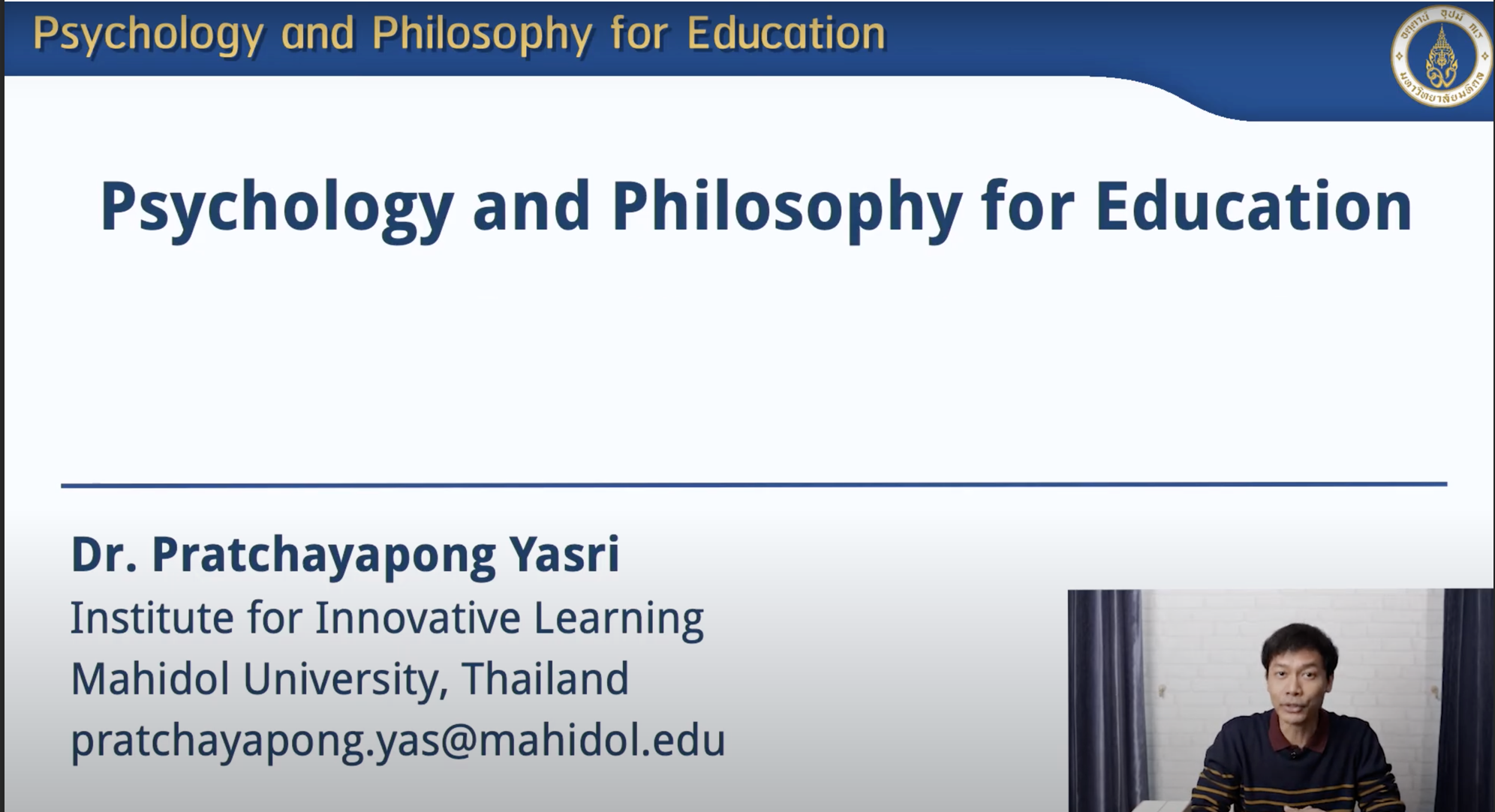ข้อมูลเบื้องต้นของรายวิชา
ชื่อวิชา จิตวิทยาและปรัชญาเพื่อการศึกษา (Psychology and Philosophy for Education)
คณะ/ส่วนงาน Institute for Innovative Learning
คำอธิบายรายวิชา
Fundamental psychology; developmental psychology; educational psychology; cognitive psychology; individual differences; inclusive education; multiple intelligences, educational guidance; counselling; philosophy, concept and theory in education, religion, economy, society and culture; educational concept and strategy for sustainable development
ความสำคัญและจำเป็นของรายวิชา
From a theoretical perspective, online-learning has been on the rise in these recent years. Its popularity has been evident among learners of this present generation who are known as digital natives. It allows them to participate in learning materials in their own convenience and on their own pace at anytime and anywhere through various options of computer devices. In addition, multimedia content is found to be more interesting and engaging than traditional face-to-face courses. Also, research studies have shown the effectiveness of online-learning in promoting students’ learning performance and attitude towards learning. Furthermore, this mode of learning helps reduce teaching time for lecturers so that they can focus more on planning class activities that can promote necessary soft-skills of students.
From a practical perspective, the current situations in Thailand, and in fact worldwide, such as the outbreak of novel coronavirus disease and the air pollution prompt us to move towards digital transformation (more seriously). It is a good opportunity to turn this incident to a positive side of educational implications. Furthermore, online courses conducted in English can promote international collaborations across universities worldwide, helping to increase the visibility of the university in return. Students enrolling in any countries can register to online courses provided by Mahidol University and gain certificates for their professional development; some of which could even be transferred and made official for university accreditation.
จุดมุ่งหมายของรายวิชา
Overall, Psychology and Philosophy for Education aims to foster students’ understanding of psychological and philosophical frameworks, ranging from theoretical to practical perspectives. Therefore, it is hoped that after completing the online part of the course, students will be able to comprehend what learning is, how they learn, what 21st century skills are, how to become (more) happy in learning, and how to become life-long learners.
การกำหนดผลการเรียนรู้ที่คาดหวัง Learning Outcome
|
LO 1 |
Students can describe learning theories and learning processes based on various psychological frameworks |
|
LO 2 |
Students can describe the roles of 21st century skills in educational practices, ranging from classroom implementations to research |
|
LO 3 |
Students can discuss how self-theories can help them develop to be become life-long learners |
ความรู้พื้นฐานที่ผู้สนใจเรียนวิชานี้ต้องมีมาก่อน
Not required
ทักษะด้านการใช้เทคโนโลยีคอมพิวเตอร์และอินเทอร์เน็ตขั้นพื้นฐานของผู้เรียนที่จำเป็นต้องมีมาก่อน
Elementary computer skills including web browsing, emailing, online-testing and word-processing
การนำผลการเรียนรู้ไปใช้ประโยชน์ / การตอบสนองความต้องการทางสังคม
Registrants with a passing score (no less than 60%) will be given a certificate to certify their completion of the online course. This certificate would ensure that they understand how to apply psychological and philosophical frameworks to improve the quality of teaching and learning in their own context. Apart from personal and professional development, those who are interested in pursuing a postgraduate degree in either MSc or PhD in Science and Technology Education at the Institute for Innovative Learning, Mahidol University can use this for ILSE660 credit transfer. However, they are required to attend extra face-to-face sessions to be fully accredited for the 2-credit postgraduate course.
แหล่งข้อมูลความรู้เพิ่มเติมที่น่าเชื่อถือใน Internet ที่เกี่ยวข้องกับเนื้อหารายวิชา
แหล่งเรียนรู้เพิ่มเติม
1. International Journal of Learning Sciences (https://www.tandfonline.com/loi/hlns20)
2. International Journal of Science Education (https://www.tandfonline.com/loi/tsed20)
3. Sawyer, R. K. (Ed.). (2005). The Cambridge handbook of the learning sciences. Cambridge University Press.
4. Driscoll, M. P. (2000). Psychology of learning. Boston, Allyn and Bacon.
บทเรียนที่เกี่ยวข้อง (Related Courses)
Coursera: Learning How to Learn: Powerful mental tools to help you master tough subjects offered by McMaster University and University of California San Diego (12 hours, free of charge, with 1.9M registrants)
การออกแบบการวัดและประเมินผล
|
วิธีการวัดผลบนระบบออนไลน์ |
สัดส่วน (%) |
จำนวนชิ้นงาน/ชุดข้อสอบ |
|
1. Quiz |
80 |
11 sets |
|
2. Assignment |
20 |
1 essay |
|
รวม |
100 |
11 |
ระบุสัดส่วนคะแนนที่ผ่านเกณฑ์การเรียนการสอน No less than 60%
ประกาศนียบัตร มี ไม่มี
ประมาณการค่าลงทะเบียน Free of charge
บุคลากรที่มีส่วนเกี่ยวข้องในการพัฒนารายวิชาออนไลน์
ข้อมูลผู้เชี่ยวชาญด้านเนื้อหา (ผู้รับผิดชอบรายวิชา)
 |
อาจารย์ผู้สอน ชื่อ–สกุล Asst. Prof. Dr. Pratchayapong Yasri สังกัด Institute for Innovative Learning, Mahidol University เบอร์โทร 0916978185 e-mail pratchayapong.yas@mahidol.edu |
